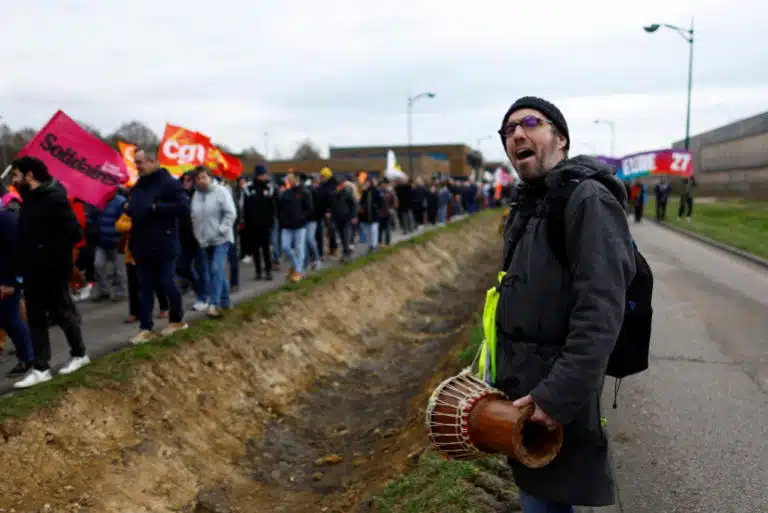While activists attempt to bring France to a halt over proposals to raise the state pension from 62 to 64, labour leaders report that fuel shipments have been suspended from all French refineries. Trains were nearly at a stop, several schools were closed, and refineries were unable to deliver gasoline.

Police protest outside the police station of Roubaix, northern France on March 7, 2024, on the sixth day of nationwide rallies organized since the start of the year.© Provided by CNBC
The CGT union’s Eric Sellini declared that the strike has started in all places.
Since the middle of January, there have also been six days of general strikes; organisations anticipated that Tuesday would be the biggest yet.
Numerous schools have been closed, but most train and metro services have been cancelled.
On Tuesday, there are scheduled to be at least 260 rallies around France, with 1.1 million to 1.4 million attendees, thus according to police estimates.
One union member, Emmanuel Lépine, declared last week that the goal of halting the fuel system was to “knock the French economy into the ground” as the government showed no indication of changing course on its pension program.
There are eight ports on The mainland, and the violent CGT movement claimed that strikers had blocked all of their gates.
How long the roadblocks would persist, although, was questionable.
There will also be calls to expand the strikes to encompass power generation in the coming days.
Despite the clamour and periodic disturbance, the campaigning has so far not materially impacted economic activity, and the legislation is moving through parliament.
The left and unions are putting more pressure on now because they are aware that there is a brief period left until the transformation becomes a reality.
The reform has already been judged “important” by President Macron due to deficits expected for the French pension system over the next 25 years, per research by the nonpartisan Pensions Advisory Council.
The government claims that in addition to hiking the retirement age by two years, employees would need to pay into France’s national pension fund for 43 years before they get their full pension.
Personal pensions that are based on infrastructure funding are rather uncommon among French workers.
There has been an economic policy trend shift towards reducing the retirement age of the working old population in Asian and European countries bordering France to tackle the longer life expectancy problem. The official statement read that the retirement age in the UK is 66 while but has been raised to 67 in Italy and significantly reduced in other countries like Germany.
As shown in a survey taken by the French data firm Elabe, the overwhelming of French citizens agree with the present strikes.
The polling suggests that 56% of respondents support rolling strikes and 59% support the call for a nationwide strike.
More than one-third of people support the protest movement against the government’s planned pension reforms in general, the results of the polling showed.
However, the number of protesters taking to the streets began to significantly slumber last month and group leaders of unions now believe that going on road strikes will gain more success.
Thierry Cottilard, head of French supermarket group Les Mousquetaires stated in a public statement that if the plants are halted France could run out of petroleum.
Government spokesman Olivier Véran while speaking to the platform France 2 said that they don’t require French people to be victims of a long-term blockade which can be harmful long term in an environmental and agronomist way.
Last week, he warned that the protests could lead to a disappointing humane disaster at structural levels.
French workers are currently on strike as a result of the country’s scorching unemployment, which unexpectedly jumped in February to 6.2% year-over-year.
The findings of an Elabe survey, around three-quarters of the population support rallies against pension revisions.
Nonetheless, numerous unions have called for ongoing, prolonged strikes to express their dissatisfaction as the number of people protesting reduced in February.
By the end of the month, Macron will try to get his plan authorized in parliament, but he may also use special reserve authority to make it happen. He might speculate that he can avoid the latter action, which runs the risk of bringing about a confidence vote and new parliamentary elections.
Though it does not hold a perfect parliamentary majority, Macron’s Renaissance party, formerly known as La République En Marche!, is assisted in its reform efforts by a few conservative Les Republicains lawmakers.
Renaud Foucart, senior lecturer in economics at Lancaster University, said that in a Squawk Box situation in Europe, he considered Macron’s chances of catching the measure were far greater than they were when he first suggested a more comprehensive package of reforms four years ago.













